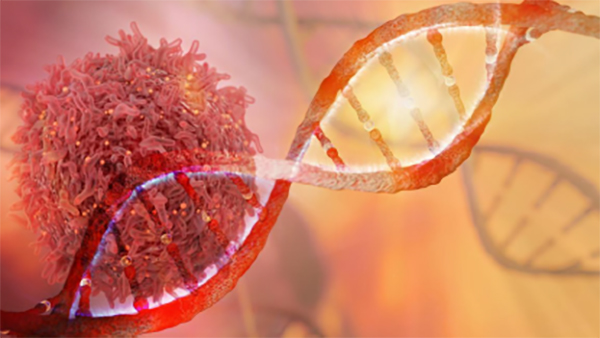A*STAR NEWS
Breast Cancer's Deadliness is Influenced by our Genes
Singapore – An international team of scientists have confirmed that both rare and common mutations of our genes are linked to the development of breast cancer- including tumour characteristics and corresponding deadliness. Interestingly- they discovered that the rare mutations were linked to more aggressive tumours- while the common mutations were associated with less aggressive tumour characteristics.
The study was led by Dr Li Jingmei- Senior Research Scientist at the Agency for Science- Technology and Research's (A*STAR) Genome Institute of Singapore (GIS)- together with a team at Karolinska Institutet in Stockholm- Sweden. The results were published in the peer-reviewed journal Cancer Research on 1 November 2018.
In 2013- breast cancer's link to genetics was thrown into the limelight when celebrity actress Angelina Jolie made headlines with her decision to undergo a preventive double mastectomy. Her reason: an 87% risk of breast cancer due to what she believed were "faulty genes" – BRCA gene mutations inherited from her mother's side of the family. Fortunately- very few women in the general population carry the BRCA gene mutation – approximately one in 400 women. However the question remains as to why women who are not BRCA carriers are still at risk of contracting breast cancer.
Dr Li's study noted that both rare and common genetic mutations are associated with different types of breast cancer. She also compared the effects of both types of genetic mutation on cancer tumours' characteristics- survival and modes of detection. Her study discovered that women with rare genetic mutations- compared to those with common genetic mutations- are more likely to develop more aggressive cancer tumours and succumb to the disease. They are also less likely to benefit from routine mammography screening as they tend to develop cancer during the screening interval.
Dr Li said- "Angelina Jolie's decision to undergo double mastectomy has greatly increased the public's awareness of genetic testing. However- not all genetic mutations are equally deadly. By identifying the type of genetic mutation- we can better predict what kind of breast cancer the patient will develop."
GIS' Executive Director- Professor Ng Huck Hui said- "Most research studies focus solely on identifying the genetic mutations that lead to cancer. GIS took a step further and examined how these genetic mutations- both rare and common types- affect the disease progression."
A successful long-standing collaboration exists between Sweden and Singapore in the fight against breast cancer. "This study is yet another example of how clinical and genetics expertise from different parts of the world are brought together. A deeper understanding of how inherited genetic variants affect breast cancer biology could have profound implications for clinical management and future screening practices-" said Professor Kamila Czene- Professor in Cancer Epidemiology and Deputy Chair at the Department of Medical Epidemiology and Biostatistics at Karolinska Institutet.

(Copyright: A*STAR’s Genome Institute of Singapore)
Genes can tell which breast cancers are deadly.
About A*STAR’s Genome Institute of Singapore (GIS)
The Genome Institute of Singapore (GIS) is an institute of the Agency for Science- Technology and Research (A*STAR). It has a global vision that seeks to use genomic sciences to achieve extraordinary improvements in human health and public prosperity. Established in 2000 as a centre for genomic discovery- the GIS will pursue the integration of technology- genetics and biology towards academic- economic and societal impact.
The key research areas at the GIS include Human Genetics- Infectious Diseases- Cancer Therapeutics and Stratified Oncology- Stem Cell and Regenerative Biology- Cancer Stem Cell Biology- Computational and Systems Biology- and Translational Research.
The genomics infrastructure at the GIS is utilised to train new scientific talent- to function as a bridge for academic and industrial research- and to explore scientific questions of high impact.
For more information about GIS- please visit www.gis.a-star.edu.sg
About the Agency for Science- Technology and Research (A*STAR)
The Agency for Science- Technology and Research (A*STAR) is Singapore's lead public sector agency that spearheads economic oriented research to advance scientific discovery and develop innovative technology. Through open innovation- we collaborate with our partners in both the public and private sectors to benefit society.
As a Science and Technology Organisation- A*STAR bridges the gap between academia and industry. Our research creates economic growth and jobs for Singapore- and enhances lives by contributing to societal benefits such as improving outcomes in healthcare- urban living- and sustainability.
We play a key role in nurturing and developing a diversity of talent and leaders in our Agency and research entities- the wider research community and industry. A*STAR’s R&D activities span biomedical sciences and physical sciences and engineering- with research entities primarily located in Biopolis and Fusionopolis.
Was This Article Helpful ?
A*STAR celebrates International Women's Day

From groundbreaking discoveries to cutting-edge research, our researchers are empowering the next generation of female science, technology, engineering and mathematics (STEM) leaders.
Get inspired by our #WomeninSTEM
